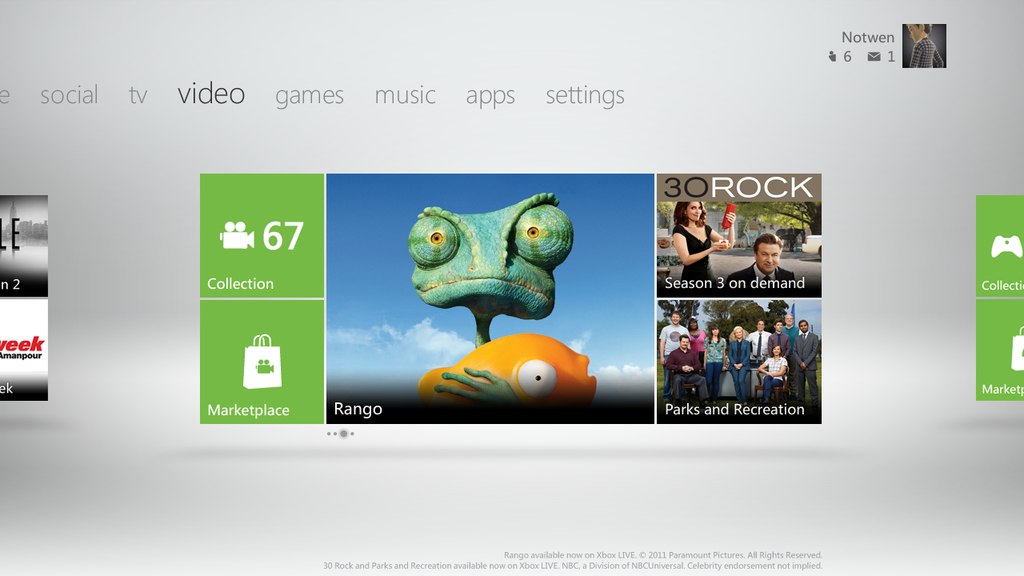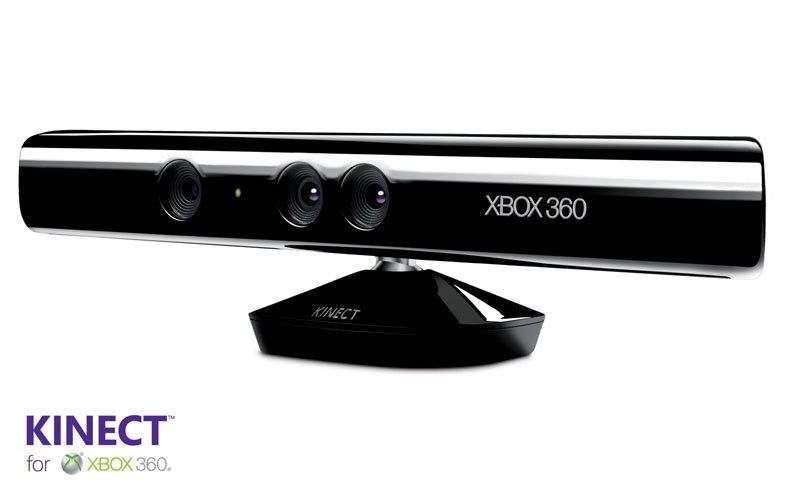Next-Gen Console Wars: 10 Steps to Dominance for the Next Xbox
This week, Hilary Goldstein examines what the next Xbox must do to beat the PlayStation 4 and Wii U.
With Nintendo's Wii follow-up, the Wii U, due at the end of this year, the talk of next-generation consoles is already crackling. Soon we'll be overcome with rumors, leaks, and speculation about the eighth generation of game systems, which includes the next hardware from Microsoft and Sony.
But what are at least 10 things each console manufacturer needs to do to find success in the next iteration of the system wars? Let's kick things off by examining Microsoft, but be sure to check back in the following weeks for an assessment on Sony, Nintendo, and the next crop of mobile devices.
What Microsoft Needs to Do
One-Stop Box
It has been a longtime assumption that Microsoft would like its console to be the only device you need in your entertainment center. With recent increases in services provided through Xbox Live, that vision is coming closer to reality. For Microsoft to win the next generation, this needs to be at the core of its next Xbox. It needs to make my cable box, Blu-ray player, and iPad irrelevant. All three of these are essential to my current entertainment needs, but outside of playing Halo or Ghost Recon, I can do more on my iPad than I can on my Xbox 360 (and it's easier). To beat the next PlayStation, Wii U, and the continuing emergence of mobile devices, Microsoft's new machine must be the only entertainment device I need in my home. I need to be able to watch and record TV, play games, shop, interface socially, and organize my life in one place. It's time to stop talking about a single entertainment box future and make it happen.

Set the Lowest Bar High
Microsoft created several versions of the Xbox 360 to accommodate consumers on different budgets, but using this strategy limits developers' options since they must make games to the lowest common denominator and often can't use the full benefits from a hard drive. While Microsoft will seek to offer a low-cost version of its next console, it can't do so at the expense of its baseline. In other words, there simply has to be a core minimum that, regardless of cost, the system cannot ever dip below.
The next Xbox must have a hard drive, Kinect, wireless Internet, and Bluetooth built in. Production cost (and therefore retail cost) on a console will always come down over time to appeal to a broader consumer base. You can't sacrifice minimum quality to shave $50 to $100 off the price for "casual" gamers, which was the game plan for the Xbox 360. If you can hack something off to sell a lower-priced system, then it wasn't a necessity, and if these items aren't a necessity, then the Xbox 720 isn't being used to its maximum capability. Sony has shown its unwillingness to sacrifice in these ways, and you can bet the fight for next-gen dominance will be too fierce to come up short in any area.
Embrace Blu-ray
Research group In-Stat predicts there will be 105 million Blu-ray units in homes worldwide by 2015 and states that 15 percent of Netflix users already receive Blu-ray discs. While on-demand and streaming services are gaining in popularity, physical media will continue to have a major place in homes through the next decade. Blu-ray will replace DVD as the dominant disc form for media during the era of the next generation of consoles. To exclude a Blu-ray disc from the next Xbox could be disastrous for Microsoft.
More importantly, Microsoft needs to embrace the free-to-play realmBut this issue isn't such a slam dunk for Microsoft. Sony (along with Phillips and Panasonic) is a major patent holder for the Blu-ray format. No company can manufacture hardware with a Blu-ray disc player without a license from the Blu-ray Disc Association, and guess who helps make those decisions? Sony. However, from a business perspective, Sony gains more by supporting Microsoft in this effort. Sony earns money on every Blu-ray device sold, meaning that Microsoft's rival can profit from new system sales and greatly increase the global Blu-ray installed base. Microsoft might be considering a streaming-focused, non-disc system, but that would defy the first rule for winning the next-generation battle: the all-in-one box.
Steam for Consoles
This isn't to say that Steam needs to come to the next Xbox (though that's a pretty good idea), but a similar service must be part of the new Xbox dashboard. Digital releases must coincide with retail ship dates, with a discount for the online purchase--this is, in fact, the best way to cut down on used-game sales. Indie games need to be more accessible and, along with traditional XBLA fare, mixed in with full retail releases. A service such as GameFly could make for a great online partner in this regard.
Most importantly, Microsoft needs to embrace the free-to-play realm. There's no viable F2P model on the Xbox 360, but the next Xbox must be built with F2P in mind. Full-priced retail releases, such as the next generation of Assassin's Creed games, will always have a primary place in the console world. But there's money--a lot of money--to be made in the F2P market. A proper revenue share model for publishers, an easy and reliable shopping experience for gamers, and prominence for free-to-play games are essential to the Xbox 720's success.
The New Gold Account
Xbox Live has seen numerous improvements over the past two years with a number of new services offered. You can access Hulu, Netflix, Twitter, HBO Go, and much more with an Xbox Live Gold account. The core service and its price model, though, are outdated. Next generation doesn't just mean better graphics; it means the future of online services. Currently, an Xbox Live Gold account lets you use your separately purchased Netflix or Hulu account through your 360. It's merely a convenience (easier, perhaps, to use my Xbox 360 than use these services from my PC). Winning the next generation means aggressive actions that make Xbox Live Gold as essential to the new one-stop box as anything else.
Microsoft is too reliant on Halo for its success.Think of the new Gold account more like signing up for DirecTV or any cable TV service. You pay a low base price that provides some simple offerings (such as multiplayer, early demo access, and cloud storage) and then select optional packages on top of this to suit your entertainment needs. Want to include (as in buy) Netflix streaming, ESPN3, and MLB.TV? Add the Sports package (with a slight discount, of course). I shouldn't need a cable box in the next generation or have to go to Netflix.com to buy a streaming account or want for any of my entertainment needs when my new Xbox is on. Xbox Live Gold has to evolve to pull us away from our external devices. The future is full consumer investment in our game system for all TV needs. Anything less opens the door for Sony and Nintendo.
A New Game Franchise
Microsoft is too reliant on Halo for its success. With Gears of War, Forza, and a very uncertain future for Fable, Microsoft is thin on its number of first-party powerhouse franchises. The next console needs to launch with something new--the next generation's Halo that isn't actually Halo.
Exclusive Bonus Content
Microsoft is already one step ahead of Sony here. The future of console success is not exclusive third-party games, but earlier releases of downloadable content. Early access to Call of Duty maps, for example, not only shifts sales heavily in favor of the Xbox, but also makes a nonexclusive game weighted more toward Microsoft's side.
Mobility Matters
Entertainment and information are no longer stuck at home. I can start a movie streaming on my PC at work, continue it on my iPad on the train, and finish it off on my TV at home. You don't need to take Halo 5 with you on a mobile device, but access to elements of your next-generation games must come with you--whether it's tracking stats, managing character progression, or playing tie-in mobile games.

HD Kinect Bundled In
The Kinect lost the core gamer the moment Microsoft abandoned using an HD camera in it (for valid cost reasons). Kinect HD needs to happen for next gen, allowing for full facial and finger recognition. And it should come bundled in with the next Xbox launch to ensure every home has one.
Kinect Integration for All Games
And with that, all games must have Kinect integration. This doesn't mean the gameplay uses the Kinect, but that there must be some surface layer (menus and interface) that have some consistent Kinect usage. Voice commands to pause games, motion commands to make menu selections--it should be a requirement. Either go all in with the Kinect or abandon it completely. Don't go halfway in the next generation.
Got a news tip or want to contact us directly? Email news@gamespot.com
Join the conversation